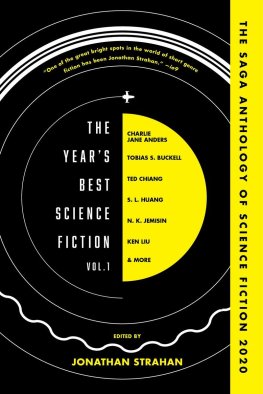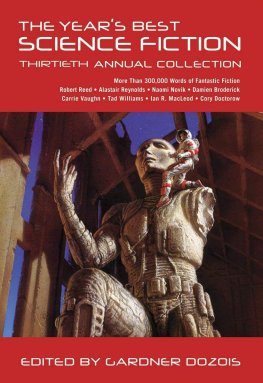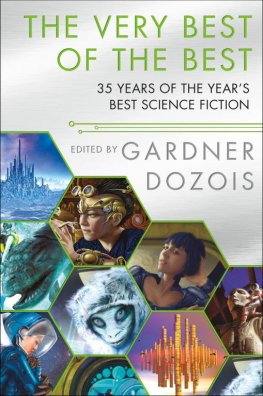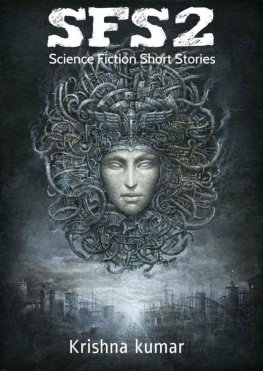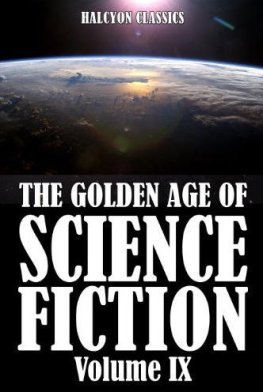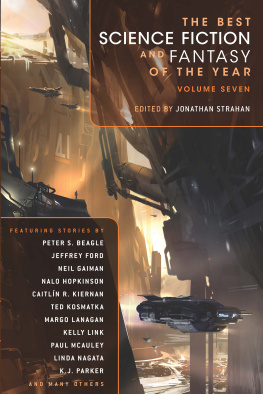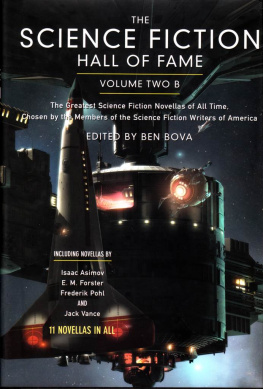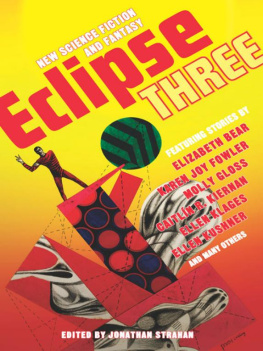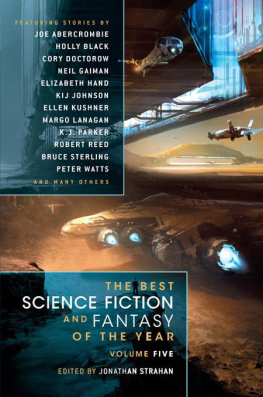The Year's Best Science Fiction
Volume 1
Edited by Jonathan Strahan

Thank you for downloading this Simon & Schuster ebook.
Get a FREE ebook when you join our mailing list. Plus, get updates on new releases, deals, recommended reads, and more from Simon & Schuster. Click below to sign up and see terms and conditions.
CLICK HERE TO SIGN UP
Already a subscriber? Provide your email again so we can register this ebook and send you more of what you like to read. You will continue to receive exclusive offers in your inbox.
In memory of my dear friend Gardner Dozois (1947-2018), who would have loved these stories.
There is no doubt in my mind that this has been among the most challenging books Ive worked on. The science fiction field has grown, diversified, and changed, which is a joy but means so much more work for everyone. For that reason, Id like to thank my editor, Joe Monti, and the whole team at Saga, who have done such a great job with this book. Id also like to thank my agent, the indefatigable Howard Morhaim, who is the best business partner I could wish for, as well as: the wonderful Liza Trombi and the entire team at Locus, who as always were extremely kind and generous; my dear friend and podcast co-host Gary K. Wolfe; Ian Mond; James Bradley; Rachel C. Cordasco, who knows more about SF in translation than anyone I know; John Joseph Adams, who provided assistance when he didnt have to; Neil Clarke, who was enormously helpful; the wonderful Nisi Shawl; Kath Wilham and Timmi Duchamp at Aqueduct Press; Steven H. Silver, who provided invaluable information for the obituary section of my introduction; and all of the authors and their agents. A special thanks to my wife, Marianne, who helped with checking this book and my own shambolic introduction, and to my two daughters, for their understanding while I slew this particular beast.
INTRODUCTION
A New Beginning
JONATHAN STRAHAN
Calendar purists may argue over exactly when the decade or the century or the millennia changes, but when the numbers change it feels like a new beginning, a fresh start, a time to take a look back. So as we move into 2020 it seems right to take stock. One fifth of the century is done, after all, and launching a new series of years best science fiction anthologies, The Years Best Science Fiction (with a respectful and affectionate nod to my old friend and mentor Gardner Dozois), seems an appropriate thing to do. This isnt the first time Ive had the chance to do this, but this time feels special, different. After all, were living in the future. Orwells 1984 is a distant memory, Princes promised 1999 party is decades ago, Clarkes 2001 is almost as old, and even the far-future 2019 of Ridley Scotts Blade Runner is now in the past.
And these are new and different times. The science-fictional world were living in was barely imaginable twenty years ago. In his introduction to The Years Best Science Fiction for 2000 Gardner Dozois speculated on the impact of ebooks, whether Amazon.com could possibly survive, if anyone would ever work out how to make money publishing short fiction online (answer: not yet), and what the continued impact of the internet and online shopping might be. He was concerned about Napster and downloading, and this was when the iPod was still a year away; the explosion of handheld devices, smartphones, and e-readers and more were all in the future and unimaginable; and no one would have believed the impact or dominance Disney, Apple, or Amazon are now having. Science fiction is at best so-so at predicting the future, but in early 2000 no one could really have imagined what was going to happen in SF and the wider world. Its true that some of the concerns that dominate our lives were on the horizon. If no one predicted every political trend, people were at least talking about saving the environment and confronting the coming climate apocalypse, something that was mostly absent from the science fiction of 2000 but which dominates our lives and imaginations and forms the underpinnings of most SF youll see today.
So, what exactly is this book youre now holding, this years best science fiction? A dedicated few readers are invested in defining what science fiction is, what exactly falls inside its bounds and is science fiction, and what falls outside and is therefore not science fiction. Its a discussion that makes for an amusing rainy afternoon distraction but can equally be the basis for terrible arguments and disagreements, and take up far too much time. In the early 1950s Damon Knight tried to define science fiction and came up with something that is often paraphrased as Science fiction is [or means] what we point to when we say it. Ive heard other interesting definitions, but for this book and this series that will suffice. Science fiction will be what I point to when I say science fiction. I think most of the people who are going to read this book arent invested in definitions of science fiction or what its role or purpose might be (beyond simple entertainment), so other than opting firmly for inclusivity over exclusivity, Id rather leave that for a conversation over a drink somewhere and move on.
Its my intention that every volume of The Years Best Science Fiction will focus on the best short SF that I read during the preceding year and felt was worth gathering together for your attentiona personal best, an honest attempt at compiling the best of everything Ive read in the past year into a thoughtful and entertaining book. You wont need to know the secret handshake or have the club code or read a whole bunch of other stuff to get the most out of what followsyoull just need to be interested in the world around you and want to read something exciting and interesting and timely. Which doesnt really tell you what this particular book is like, or even what its intended to be like. Science fiction has been moving steadily, with a few bumps along the way, to a more inclusive, more diverse kind of fiction, one that doesnt preference specific voices over others, and one that is open to telling stories from a wide range of perspectives. Its a type of science fiction that isnt too worried about how strictly science fictional things are, but allows the genres to blur and mix a little: less of a purists game, which strikes me as a good thing. And this book will hopefully reflect all that: stories for lovers of science fiction and for people who just love great stories.
If you take a look at the two SF it books of 2019, neither actually broke much new ground in science-fictional terms and werent too concerned if they blurred and blended genre a little. Tamsyn Muirs debut, Gideon the Ninth (Tor.com), is science fantasy, a gothic space opera about lesbian necromancers getting together to try to save the universesort of. It came out two thirds of the way through the year and everyone went wild for it. Is it SF or fantasy? It didnt seem to matter a lot because it was fresh, new, and of the moment. The other book was a novella, This Is How You Lose the Time War by Amal El-Mohtar and Max Gladstone (Saga), a story told in notes and messages left by two agents on opposite sides of a time war as they fall in love. Again, the bones of the story were science fiction, but while the story was justifiably widely adored it did little new. The feeling right now is that working out how to represent the entirety of the community we see around us in fiction is what counts, and that doesnt seem like such a bad way to look at things to this reader.

